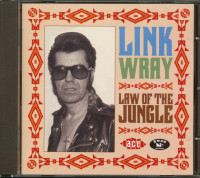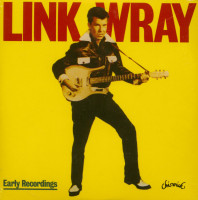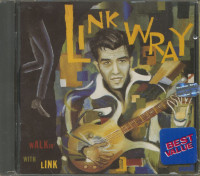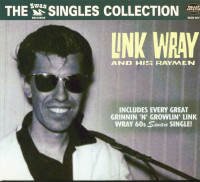Link Wray Early Recordings - Good Rockin' Tonight (CD)

* incl. VAT / plus shipping costsDepending on the country of delivery, the VAT at checkout may vary.
Item is temporarily out of stock.
Approx. delivery time: up to 3 weeks. (as far as available at the supplier - can be faster, but sometimes unfortunately not)
- catalog number:CDCHD1460
- weight in Kg 0.1
Link Wray: Early Recordings - Good Rockin' Tonight (CD)
Listening to this record gives me the same feeling as Ritchie Valens’ brilliant instrumental ‘From Beyond’ – recorded in 1958, the same year ‘Rumble’ was released: the sense of electricity discovered and unchained. The electric guitar, once highlighted and harnessed to an unvarying, minimalist beat, turned into a sound of such melodic brutality that it appeared to embody all the existential threat of early rock’n’roll: the sound of the repressed – in these two cases Mexican Americans and Native Americans – seizing their moment and their place in the sun.
That’s a lot to load onto a series of brief, catchy instrumentals but there is a power in these records that goes beyond the simple desire to have a hit or even have some product you can sell at gigs. The Valens track was a one-off – who knows whether or not he’d have pursued this route if he had lived – but Link Wray continued to make haunting, tough, lean and mean records until 1966 that at once moved with the times, ‘Batman Theme’ for one, but also stayed close to that founding sense of marginality and danger.
“Early Recordings” was released in 1978, one of the earliest Chiswick LPs. Principally, it collected the singles Wray recorded for Swan between 1963 and 1966. You’ve only got to scan the titles on the back sleeve – ‘Ace of Spades’, ‘Jack The Ripper’, ‘I’m Branded’, ‘Cross Ties’, ‘Good Rockin’ Tonight’, ‘Deuces Wild’. This is music from the wrong side of the tracks, an outsider mythology that goes with the hip, stripped sound of the 45s, that conjures up mental images of smoky saloons, juke joints, late night poker games, black leather motorcycle gangs, chicken runs at 120mph: what the American Wild West became after the frontier was finally closed. The records totally live up to this promise, or is it a threat? Or both? Who cares? Let’s go!
In retrospect, 1978 was the perfect time to reissue these tracks, very few of which had been released in Britain. In their artistic minimalism and melodic fury, they signalled a straight line between first wave rock’n’roll, hard rock groups such as the 60s Who (Pete Townshend: “If it hadn’t been for Link Wray and ‘Rumble’, I would have never picked up a guitar”) and the scalding, distorted electricity of the early punk groups – most notably the Cramps, who adapted ‘Jack The Ripper’ in their version of Dwight Pullen’s ‘Sunglasses After Dark’. As Poison Ivy said in a 2000 interview: “My favourite guitarist is Link Wray. I just like hearing a lot of strings splashing all at once. And just the austerity and the starkness of how he plays, you know? The drama that’s created by not overplaying.”
Article properties:Link Wray: Early Recordings - Good Rockin' Tonight (CD)
Interpret: Link Wray
Album titlle: Early Recordings - Good Rockin' Tonight (CD)
Genre Rock'n'Roll
Label Ace Records
Artikelart CD
EAN: 0029667074728
- weight in Kg 0.1
| Wray, Link - Early Recordings - Good Rockin' Tonight (CD) CD 1 | ||||
|---|---|---|---|---|
| 01 | Batman Theme | Link Wray | ||
| 02 | Ace Of Spades | Link Wray | ||
| 03 | Cross Ties | Link Wray | ||
| 04 | Jack The Ripper | Link Wray | ||
| 05 | Hidden Charms | Link Wray | ||
| 06 | I'm Branded | Link Wray | ||
| 07 | The Shadow Knows | Link Wray | ||
| 08 | Fat Back | Link Wray | ||
| 09 | Run Chicken Run | Link Wray | ||
| 10 | The Black Widow | Link Wray | ||
| 11 | Scatter | Link Wray | ||
| 12 | Turnpike USA | Link Wray | ||
| 13 | Mr Guitar | Link Wray | ||
| 14 | Rumble | Link Wray | ||
| 15 | Good Rockin' Tonight | Link Wray | ||
| 16 | Deuces Wild | Link Wray | ||
| 17 | Mustang | Link Wray | ||
| 18 | Heartbreak Hotel | Link Wray | ||
| 19 | Law Of The Jungle | Link Wray | ||
| 20 | Blueberry Hill | Link Wray | ||
| 21 | The Swag | Link Wray | ||
| 22 | Rumble | Link Wray | ||
| 23 | Run Boy Run | Link Wray | ||
| 24 | Honky Tonk | Link Wray | ||
| 25 | The Sweeper | Link Wray | ||
| 26 | Hound Dog | Link Wray | ||
| 27 | That'll Be The Day | Link Wray | ||
| 28 | Zip Code | Link Wray | ||
| 29 | Please Please Me | Link Wray | ||
Link Wray may well have been the loudest rock guitarist I’ve ever heard in a concert setting. Considering that over the decades I’ve also luxuriated in the teeth-rattling fretwork of Roy Buchanan and Dick Dale, that’s saying a whole lot (granted, I’m not a heavy metal devotee). That extraordinary volume boost was a necessity for Wray; a childhood bout with the measles had robbed him of a good portion of his hearing (and some of his eyesight too, for that matter). Dedicated Wray fans didn’t mind a temporary bout with deafness in the slightest following one of Link’s signature shredfests; his pulverizing power chords and screaming staccato lead licks were the very definition of what rock guitar has always been and should forever be, making it a small price to pay. What’s more, Link never stopped epitomizing the concept of cool. He proudly wore a leather jacket and shades onstage well into his 70s, when his demographic peers outside the music business had long since donned cardigan sweaters and settled into comfy easy chairs.
Stardom didn’t come easily for Wray; he and his brothers had to work long and hard to escape the impoverished circumstances of their youth and find a foothold in the music industry. Fred Lincoln Wray, Jr. was the middle musical sibling, born May 2, 1929 in Dunn, North Carolina. Vernon was five years older than Link, born January 7, 1924 in Fort Bragg, N.C., and Doug five years younger (July 4, 1934). The Wray boys did some singing at the same church services where their mother, a full-blooded Shawnee Indian, preached the gospel. Link picked up some early guitar lessons when he was eight from an African American slide specialist called Hambone, who taught him the rudiments of how to play the blues. The Wray family moved to Portsmouth, Virginia during the mid-‘40s, but Link was in no particular hurry to embark on his musical career—he didn’t buy his first electric axe until 1949. Link was drafted in ’51, stationed first in Germany and then in Korea, where he was felled by tuberculosis. Finally back in the U.S. in 1953, he bought a Les Paul guitar and a Premier amplifier and got serious about his playing. But he was never quite able to duplicate the elegant, complex technique of his hero, Chet Atkins, so he developed his own mind-melting attack. Jazz guitarists Tal Farlow, Les Paul, and Barney Kessel and country picker Grady Martin also caught his ear, although he wouldn’t end up playing like any of them either.
The Wrays formed a country band in 1954 to play the rough-and-tumble gin joints around Portsmouth and nearby Norfolk, recruiting their cousin, Brentley ‘Shorty’ Horton, to play bass and provide comic relief with Doug on drums, Vernon on rhythm guitar and occasional piano, and Dixie Neal, the brother of Gene Vincent’s bassist Jack Neal, on steel guitar. They were billed as The Lazy Pine Wranglers for a time, then Lucky Wray (Vernon’s temporary alias, stemming from his gambling skills) and The Palomino Ranch Gang. A connection with pioneering country broadcaster Connie B. Gay in Tidewater, Virginia led to the group minus Neal relocating to Washington, D.C., where Gay had established a popular television program, ‘Town and Country Time,’ hosted by young accordion wielder Jimmy Dean. For all its political sophistication, D.C. was loaded with hillbilly talent and plenty of watering holes in which to showcase it. In addition to the personable Dean, Marvin Rainwater and guitarist extraordinaire Roy Clark were part of the bustling scene. All three of them recorded for producer Ben Adelman, the owner of Empire Studio there (West Virginia native Patsy Cline cut her first demos, long since lost, under Adelman’s supervision with Dean’s Texas Wildcats backing her). Although his legend rests solidly on a legacy of blistering instrumentals, Link’s debut release in January of 1956 for Adelman’s Kay label paired two of his raucous rockabilly vocals, I Sez Baby and the all but incomprehensible Johnny Bom Bonny, as half of an EP that Link shared with the obscure duo of Bob Dean and Cindy.
Adelman indefatigably hustled his finished masters to various labels; he found a home for three country-oriented singles by the considerably smoother-voiced Lucky Wray (It’s Music She Says, Got Another Baby, and Teenage Cutie) at H.W. ‘Pappy’ Daily and Don Pierce’s Starday Records in 1956-57, the last one sub-billing Link and Doug on its label. Starday released the masters through its custom service rather than issuing them on the main label, intending them for regional exposure only with the manufacturing costs paid by the artists themselves. Right in the middle of it all, the TB that Link had contracted in Korea sent him to the hospital in the summer of 1956 all the way until March of the following year. A grueling operation to remove his left lung largely put an end to any serious singing aspirations; from here on, Wray would concentrate on his blazing guitar technique and mostly leave the vocal duties to others, in particular his brother Vernon, whose prospects looked bright once Bernie Lowe and Kal Mann’s Philly-based Cameo Records brought him aboard in mid-1957. The songwriting duo was on a real roll, having penned Elvis’ pop chart-topper (Let Me Be Your) Teddy Bear. Their label was too, scoring its own number one seller that same year with Charlie Gracie’s Butterfly.
As Lowe led the choir-cushioned orchestra, Vernon crooned the Mann/Lowe copyright Remember You’re Mine, issued in June of ’57 after the label flipped the singer’s name so he was billed as Ray Vernon. Cameo even sprang for a full-page ad promoting the single in ‘The Billboard.’ But any hopes of a hit were dashed when Pat Boone covered the tune for Dot, taking it into the Top Ten and leaving Ray’s original in the dust (its bouncy flip Evil Angel might have nicely suited Gracie). Cameo responded to Boone’s cover by replacing Remember You’re Mine with I’ll Take To-morrow (To-day) as Evil Angel’s plattermate; Link’s biting axe was prominent on the new ballad, unlike its sedate predecessor. Cameo tried again with Ray that autumn with the rocking I’m Counting On You, penned by Atlanta-born blues shouter Chuck Willis (1957 was a big year for Chuck; his revival of the ancient blues C.C. Rider for Atlantic, perfectly tempoed for dancing The Stroll, sailed to the top of the R&B charts). This time, Link made his presence felt with a searing solo, and even if the arrangement was a tad rough around the edges, Ray’s encore outing stood as a contender for hitdom yet didn’t quite make the grade.

Ready to ship today, delivery time** appr. 1-3 workdays

only 1x still available
Ready to ship today, delivery time** appr. 1-3 workdays

Item has to be restocked

Ready to ship today, delivery time** appr. 1-3 workdays

Ready to ship today, delivery time** appr. 1-3 workdays

Ready to ship today, delivery time** appr. 1-3 workdays

the very last 1 available
Ready to ship today, delivery time** appr. 1-3 workdays

Ready to ship today, delivery time** appr. 1-3 workdays
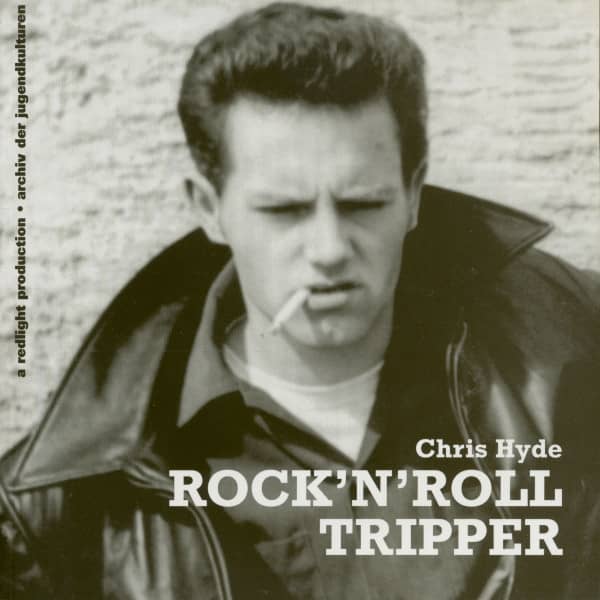
only 2x still available
Ready to ship today, delivery time** appr. 1-3 workdays

Ready to ship today, delivery time** appr. 1-3 workdays
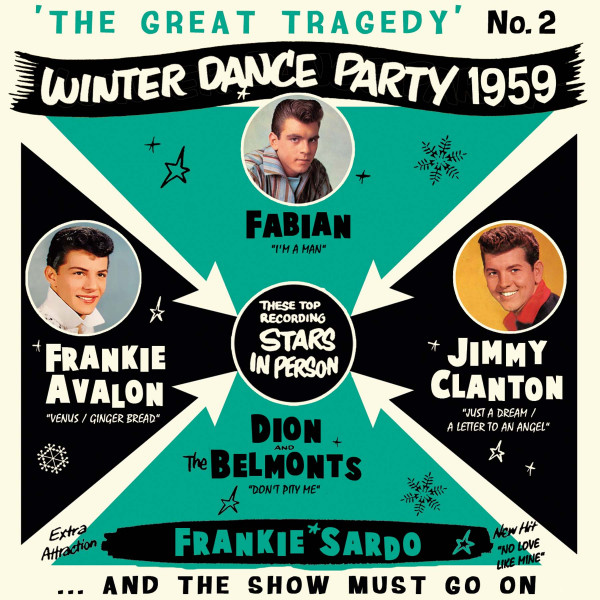
Ready to ship today, delivery time** appr. 1-3 workdays

Item has to be restocked

Ready to ship today, delivery time** appr. 1-3 workdays

Ready to ship today, delivery time** appr. 1-3 workdays












